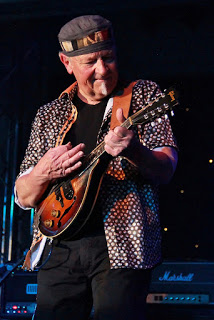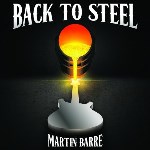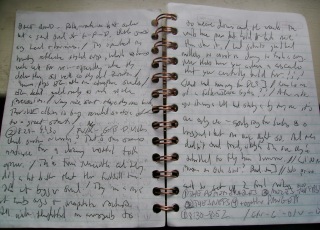Martin Barre @ Ram's Head On Stage, Annapolis, Maryland - 11 Apr 2016.
When a band gets me to travel out of town (Annapolis) just four months after I last saw them and if you know my intense dislike of travel, then you can easily conclude I am a big fan. That said, I was interested in what this new tour had to offer as Martin Barre and his band are delving deeper into the US at the start of this more intensive tour. The previous Jammin Java show was surprisingly excellent, exceeding my moderately high expectations. I also really enjoyed interviewing Martin Barre six weeks back as he was easy and fun to talk with and had several insights into the music business and furthered my Jethro Tull knowledge base.
Tonight it is the same great band as it has been for over a year now. George Lindsay anchors it all on drums and you may not notice him with all the talent downstage, but when I listen carefully I noticed he has just enough artistry to add some subtle touches which add to the song's complexity without getting in the way of the main thrust. Alan Thomson plays bass, some slide guitar and mandolin and is a brilliant progressive player with a quiet fluid style that has worked in the past with such diverse artists as Rick Wakeman and Bo Diddley. So it is easy to see why it works here so well. Dan Crisp provides the vocals and very effective second guitar where he can solo and work around Martin Barre's moves to add an extra layer of excitement to the song.
Of course, the large crowd tonight is excited to see Martin Barre and were not disappointed. Not only was Martin in top form with his playing and creative reworking of Jethro Tull songs, but his energy levels were way up there and between the crowd and the band, this Monday night show was even hotter than the previous show I attended. And it is all the more impressive at a seated club like this one. There were more originals worked into the set and they were accepted well, as the bluesy rock base of each one had plenty of fire within. Of course, the Jethro Tull catalog was explored with fairly faithful renditions (albeit still reworked for two guitars) to songs like a mandolin jig that becomes 'Hymn 43' or the originally mandolin based 'Fat Man' which now becomes guitar based. Even the encore 'Locomotive Breath' which although not one of my personal favorites (especially without the great piano intro), becomes a fresh invigorating version with guitar moves that snake around with dramatic flair until a new beast is formed.
This was a blast for me and you could feel the excitement level rise throughout the night, so this is not a band to be missed if they head to your town or when they return to our area.
Interview with Martin Barre, March 2016

After having the enormous pleasure of interviewing Ian Anderson two years ago, I now have the extraordinary bonus of interviewing his long time collaborator and guitarist Martin Barre. They were in Jethro Tull together well over 40 years and now both are quite active with their own bands.
David Hintz: …and I’ll be running this in my DC Blog before the show in Annapolis and in Folkworld, a European webzine… we are rather loose with the definition of folk, but you fit.
Martin Barre: Well, yeah. That never worries me or intimidates me. [...]
Right. I will start off with a prediction I had made or thoughts I had when you stopped with Jethro Tull. I believed you would be hanging around in England, quietly working some blues clubs with recordings here and there. But now you have a full band, a steady stream of new records and are doing an awful lot of touring. How much time are you on the road these days?
More and more because we are building up the band. We do a fair amount with four pretty busy years, although it’s great even with tensions of getting more and more shows and really, I’m just starting off in America, so there are huge possibilities in the different territories of the USA. I am probably doing less of England and a bit less in Europe, because the clubs in England are pretty well at a dead end. But I love festivals, so we do as many festivals as possible. But at the moment it is really focused on the States. [...]
Now just in general, in your long career you have had plenty of space to be a highly creative force, but now you are the clear leader, at least on the marquee. How big a change is this for you?
A huge change because when Jethro Tull finished, I took stock of where I was in my personal life in every aspect, particularly musically. And the first thing that dawned on me was that I was getting very dormant on a musical level because Jethro Tull had become very antiseptic. There was no fire left in the band at all and wherever you are with a band that becomes normal, whether you are top of the game or settling down and going through the motions.That becomes your normal mode of operation and I realized that my mode is very very low. So it was a bit of a wake-up call. So the first thing I did was to record an acoustic album because I had to think very hard at how to proceed with my career. And it suited me to sit at home in my studio, writing a load of music and then record it as an acoustic album. It was really good fun because it was intense musically and kept me really, really busy. It got me playing again; it got my brain working, fingers working. I really enjoyed doing it.

And at the same time, the band was being pulled together and doing shows to find where I wanted to go with the electric side of it. That took another year for the band and for me to find what I really wanted to do.
Interesting… and I can continue to see that on your albums as you continue to mix styles and instruments. And I am sure one of the things you enjoy is creating your own setlist. And I really have to give you top marks for that at the show I saw. I had no idea you would come up with such an eclectic group of originals, Jethro Tull songs, blues standards, and interesting covers and I have a few questions about those.
Well, that makes me very, very happy because that part of it is so important and in the latter days in Tull, I would go to Ian and say let’s try this song or try doing that and nothing ever happened. I know that Ian was restricted with his voice problems.
But it just meant the door was closed on a huge area of the Jethro Tull catalog. And I love experimenting, I love challenging an audience. So I am really pleased that you say that, because that to me is the ultimate test for the people that go to a gig. If they go ‘wow, I wasn’t expecting that’. That works in my book. I don’t want to be predictable. I don’t want to do normal. I have the Jethro Tull heritage but I want to use that in a very constructive way. I maybe want a reconstructing recipe with Jethro Tull music by taking the essence that you really have to keep and the rest I will reconstruct it. Obviously there is no flute so I have a lot of area to put guitar playing into. I have enjoyed doing that and I think that the audience may as well because it still pays respect to the song, but is fresh, it’s new, it’s got energy and it works.
I found that interesting too, as there must be some careful thought on your part to where some songs sounded very close with even your singer doing the vocal inflections really well and other times, it’s like Wow—you’ll just take off and go off in a crazy fun unknown direction.
Yeah, I never gave Dan, as he was learning all these songs, that the melody is pretty written in stone, but if you mess with the melody, it is you—you are singing it and I want your personality in it. I don’t want a reproduction of Ian’s personality. I know you said about the inflections and I guess it is hard not to, but I think Dan is his own person. [...]
Right. How about the blues songs—the classics that you choose? What is your methodology there?
Again, I am not playing straight blues. There were people who did that incredibly well, if you look back to Stevie Ray. There are some great pure blues players. It is not particularly my area, although I love the blues and I play blues guitar—we all do as: blues as rock; blues as folk; blues as country… there are blues styles in all music. But I am going to make it a bit different such as ‘Smokestack Lightning’ for instance. And ‘Crossroads’ when I do that, I want to make it fresh, different. And with the Smokestack blues chords, I’ll try to make it more like a song someone would write today, rather than an old blues classic. When you see the guy… I saw Willie Dixon play on Youtube and it’s unbelievably good, but all it is, is a riff that goes on for ten minutes. And you can’t do that because you’ll never sound as good as him—only he could do that. You gotta pay them respect by leaving it alone, it’s their heritage, leave it there. But I love the music so I’m going to develop the blues that I play on stage. [...]
Was there any of the British folk music in your early days that was influential along with the Blues?
There wasn’t because early folk music for me was where I went to folk festivals that my sister dragged me to in the mid-sixties and I really hated it. Because folk music in those days was someone standing with a guitar strumming three chords and was really really boring. And there was no musicality in it. And now, unbelievable bands… there are Irish bands who are phenomenal musicians. And their approach with sympathy of folk music is a completely different animal. And it is fabulous and I am in awe of the people who play that style of music. And in America, bluegrass.
Incredible, incredible players… I love it, it’s fabulous and I’ll never be good enough to play it, but I enjoy listening to it and I try to bring some of it out in the music I write, as much as I can. [...]

Photo Credits:
(1)-(3) Martin Barre,
(4) Ian Anderson
(unknown/website).